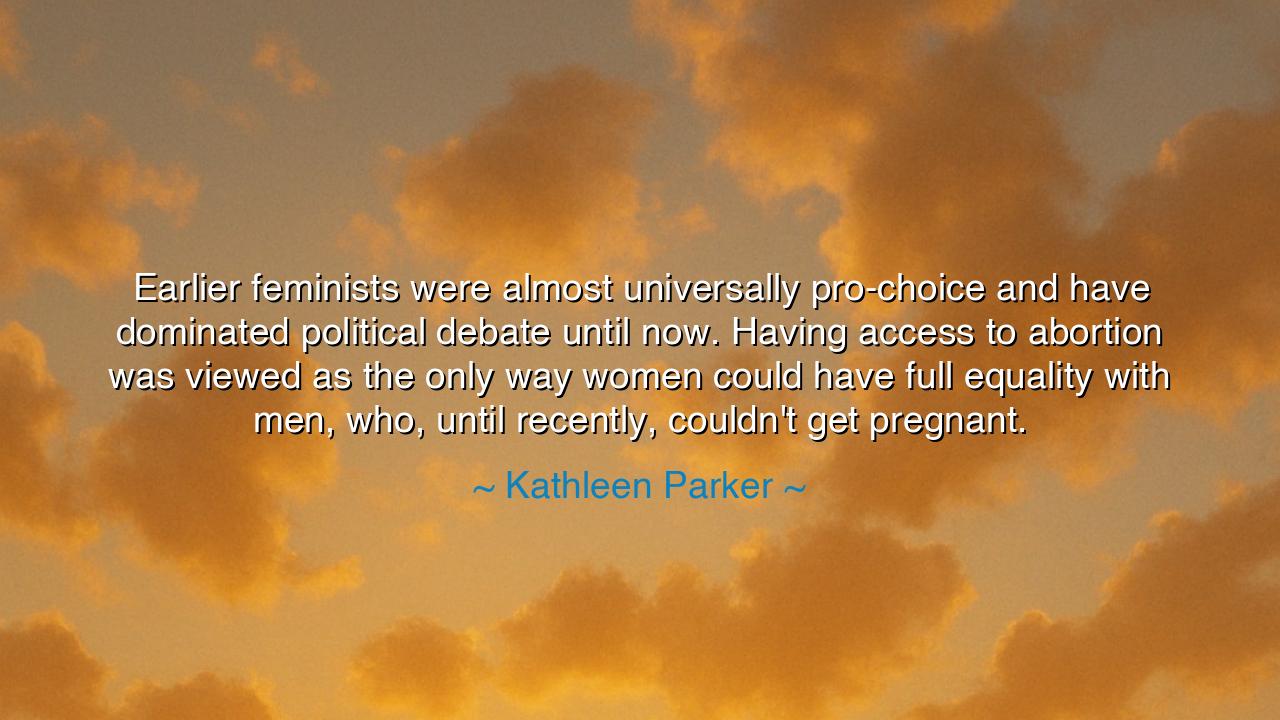
Earlier feminists were almost universally pro-choice and have
Earlier feminists were almost universally pro-choice and have dominated political debate until now. Having access to abortion was viewed as the only way women could have full equality with men, who, until recently, couldn't get pregnant.






In the reflective words of Kathleen Parker, writer and observer of the human condition, we find a meditation upon one of the great moral and social struggles of our time: “Earlier feminists were almost universally pro-choice and have dominated political debate until now. Having access to abortion was viewed as the only way women could have full equality with men, who, until recently, couldn’t get pregnant.” Her words carry both history and tension—the echo of decades of debate about freedom, equality, and the moral burden of choice. Beneath them lies a question that has haunted generations: what does it mean for women to be equal to men, and at what cost is that equality defined?
To understand the meaning of this quote, we must return to the heart of the feminist movement itself. In its earliest and most fervent waves, feminism arose not as rebellion, but as reclamation—a call for women to possess their own bodies, minds, and destinies. For centuries, men had moved freely through the world, shaping their fates by will and ambition, while women were bound by biology and the expectations of society. Pregnancy, that sacred yet binding power, was often used to confine women to domestic life, to deny them education, opportunity, or the right to self-determination. Thus, when early feminists demanded the right to control their reproduction, they saw abortion not as defiance of nature, but as liberation from inequality—a means to stand as equals before law, labor, and life itself.
The origin of this belief can be traced to the early twentieth century, when figures like Margaret Sanger and Simone de Beauvoir ignited a revolution of thought. Sanger, in America, fought to make contraception accessible, believing that without control over fertility, no woman could ever truly be free. De Beauvoir, in her monumental work The Second Sex, declared that woman’s destiny had been written by her biology, and that freedom could only come when she could say, “I am not defined by my womb.” These thinkers were not without controversy, but they gave voice to a generation that refused to accept that motherhood must be a chain. To them, the right to choose was not only a legal or medical matter—it was a spiritual declaration of equality, a breaking of ancient patterns that had kept women subordinate to the rhythms of male power and patriarchal law.
Yet Parker’s reflection also carries within it a subtle critique, a questioning of the assumptions that shaped those early battles. For in her words there is both acknowledgment and inquiry. She observes that the idea of equality through abortion arose from a comparison to men—men who, as she notes with irony, “couldn’t get pregnant.” This is the heart of her insight: that the struggle for equality was defined not by womanhood itself, but by a yearning to mirror manhood. In seeking equality by negating the biological difference, feminism risked accepting a masculine measure of worth. The power to bear life, once seen as a divine and defining force, was reimagined as a hindrance. Parker’s words compel us to ask: can equality be built upon denial of what makes us different, or must it be built upon the celebration of that difference, protected by justice and compassion?
Consider the story of Roe v. Wade, decided in 1973, when the United States Supreme Court ruled that a woman’s right to privacy extended to her decision to terminate a pregnancy. For millions, it was the culmination of a long and painful journey toward self-determination. It gave women, for the first time in modern history, legal authority over their own reproduction. Yet, as decades passed, the victory became a battlefield, and the unity of earlier feminists began to fracture. New generations arose who questioned whether abortion was the only—or even the truest—path to empowerment. Some saw in Parker’s observation a warning: that equality must not mean sameness, and that freedom cannot flourish when it is built upon moral division.
The deeper wisdom in Parker’s words lies in her recognition that the struggle for women’s rights is not only political but profoundly human. The tension between autonomy and responsibility, between freedom and life, will always stir the conscience of humankind. True equality, she implies, must go beyond imitation or defiance—it must find harmony between the natural and the just. The early feminists fought the battles of their time with the weapons available to them; their courage opened the gates of education, labor, and law. But now, a new generation must ask different questions: what does equality mean when biology is no longer destiny? What does liberty mean when science, society, and morality all vie for its definition?
The lesson for us, then, is not to scorn the past, but to continue the dialogue it began. Equality is not a finished monument, but a living flame—it changes shape as humanity learns, grows, and questions. Let us honor those who fought for choice, but also listen to those who seek a broader vision of justice—one that respects life in all its forms, one that values both the power to choose and the sanctity of creation.
Therefore, let us take Kathleen Parker’s words as both reflection and prophecy. She reminds us that freedom and equality are not inherited, but continually redefined. The women who came before us sought to cast off the chains of subjugation; those who come after must ensure that in gaining liberty, we do not lose our reverence for life. For the truest form of equality does not erase difference—it exalts it, binds it to justice, and teaches humanity to cherish, not conquer, the sacred balance of nature and choice.






AAdministratorAdministrator
Welcome, honored guests. Please leave a comment, we will respond soon